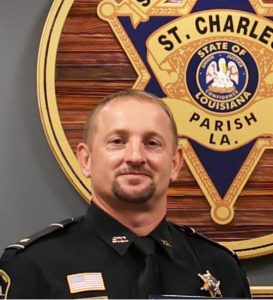SATURDAY, January 31, 2026 Seminar Sessions
Behind the Transaction: Power, Money, and Prostitution
SATURDAY, JANUARY 31, 2026 | 8:30AM TO 9:30AM | COMMERCE ROOM
In Las Vegas—and across the United States—the landscape of prostitution has evolved far beyond the traditional narratives. What may appear on the surface as a solitary act of street-level sex work often conceals a sophisticated network of criminal activity.
This training will equip participants with the tools and knowledge to look past the individual and uncover the broader criminal enterprise. From money laundering and narcotics to gang involvement and organized human trafficking, prostitution frequently serves as a gateway to a web of serious offenses.
Through real case studies, investigative strategies, and intelligence-sharing techniques, attendees will learn how to “follow the working girl” to trace financial flows, identify co-conspirators, and dismantle the criminal networks operating in the shadows.
PRESENTERS: Jenn Benjamins, LVMPD Sergeant (Ret), Owner/Lead Instructor, Covert Blue LLC
 Jenn Benjamins is a Retired Sergeant from the Las Vegas Metropolitan Police Department with over 22 years of real-world experience in patrol, case investigations, and covert/undercover operations.
Jenn Benjamins is a Retired Sergeant from the Las Vegas Metropolitan Police Department with over 22 years of real-world experience in patrol, case investigations, and covert/undercover operations.
Her interest in undercover work led her to the Vice Section, where she refused to be limited by traditional expectations. While excelling in female undercover roles, Jenn was determined and succeeded in working undercover alongside her male counterparts. She went on to develop a specialized training program within the Vice Section, implement policy, and conduct department-wide training on vice crimes and related laws.
Throughout her career, Jenn worked a wide variety of undercover assignments, collaborating not only with specialized units such as Narcotics, but also with federal partners including the ATF, DEA, and FBI. These experiences gave her a rare perspective on the skills, strategies, and challenges unique to undercover operations.
Jenn also has a deep dedication to her fellow first responders. She makes herself available for support, advice, and connecting others with resources for mental health and life after the job. She continues to study and coach in the field of Emotional Intelligence, helping others grow in self-awareness, resilience, and personal development.
Recognizing a critical need, Jenn has made it her mission to provide specialized training through her company, Covert Blue LLC, for women and men in undercover roles; programs that build technical expertise while also addressing the unique dynamics and challenges undercovers face in operations.
Keel Mind and IGNITE
SATURDAY, JANUARY 31, 2026 | 8:30AM TO 9:30AM | STATE ROOM
Description to come…
PRESENTER: Jennifer Hull, Deputy Director First Responder Mental Wellness, Keel Digital Solutions, and Bob Stanberry, Director First Responder Mental Wellness, Keel Digital Solutions
 Jennifer Hull is a highly experienced law enforcement professional with over 23 years of service in the field. A former Staff Sergeant with a local Sheriff’s Department, Jennifer brings a wealth of knowledge and practical experience to her work. Her career includes not only frontline law enforcement but also valuable dispatch experience, which has rounded out her understanding of the diverse challenges faced by first responders.
Jennifer Hull is a highly experienced law enforcement professional with over 23 years of service in the field. A former Staff Sergeant with a local Sheriff’s Department, Jennifer brings a wealth of knowledge and practical experience to her work. Her career includes not only frontline law enforcement but also valuable dispatch experience, which has rounded out her understanding of the diverse challenges faced by first responders.
In addition to her extensive background in law enforcement, Jennifer serves on Michigan’s Line of Duty Death (LODD) team, offering support to officers and their families during the most difficult times following the death of an officer in the line of duty. This role underscores her deep commitment to the safety and well-being of those who serve the public.
In addition to her hands-on work in law enforcement, Jennifer has shared her expertise as an educator, teaching at local colleges and universities imparting her knowledge to the next generation of aspiring officers and public safety professionals.
Currently, Jennifer works with Keel Mind, an organization dedicated to supporting the mental health and wellness of first responders. Through her work at Keel Mind, she advocates for mental health resources and programs tailored to the unique needs of those who serve in high-stress environments, aiming to reduce the stigma around mental health issues in the first responder community.
With a lifelong commitment to public safety, education, and mental health advocacy, Jennifer Hull continues to make a meaningful impact in the lives of first responders and the communities they protect.
 As an Advisor for Keel Mind, Daniel Stewart is dedicated to advancing mental wellness solutions that integrate peer support and AI technology to enhance the mental healt and performance of correction officers. With a deep understanding of the challenges faced by first responders, Daniel focuses on innovative approaches that provide real-time support and long term benefits for those working in high stress environments. His expertise spans mental wellness, operational efficiency, and the development of tailored solutions for correction professionals nationwide.
As an Advisor for Keel Mind, Daniel Stewart is dedicated to advancing mental wellness solutions that integrate peer support and AI technology to enhance the mental healt and performance of correction officers. With a deep understanding of the challenges faced by first responders, Daniel focuses on innovative approaches that provide real-time support and long term benefits for those working in high stress environments. His expertise spans mental wellness, operational efficiency, and the development of tailored solutions for correction professionals nationwide.
Stewart served in the New York State executive branch, serving four governors as he led the regulatory oversight agency of the New York State Correction System NYSCOC, including all state prison facilities, county jail facilities, and the New York City department of correction (Riker’s Island), secure juvenile facilities and all police department lockups. The agency was initially created as a response to the Attica uprising, to depoliticize prison and jail operations and oversight.
Prior to his state service, Stewart served three terms as a City Councilor, and then three terms as Mayor of the City of Plattsburgh, New York. He helped to achieve the national ranking of being the #1 Small City in the United States by Site Selection Magazine for small city development opportunities. He was a team member in the re-use of the former Plattsburgh Air Force Base upon its BRACC Commission closure, widely recognized as the best re-use example of a military facility asset in the United States.
Stewart served his country as a Sergeant in the U.S. Armed Forces. During his service, he was awarded one achievement medal for professionalism and another for actions taken during an operational situation. He also earned the good conduct ribbon, longevity ribbon and an outstanding unit ribbon while on active duty.
After serving eight years of active duty, Stewart departed the military with high hopes, but shortly thereafter became a homeless veteran with major drug and alcohol addiction issues, and unaddressed PTSD. He found his way to sobriety in December of 1988 and has stayed clean and sober since that time. Twelve years after being homeless and living under a bridge for a period, he was sworn into office as the mayor of that same city. A road less traveled, but one that provides hope to others that he openly shares in hopes of inspiring others to face their personal situations.
Stewart’s service in local, state, and federal government service gives him a keen knowledge and understanding of the many implications and challenges involved in the decision-making process for deploying technology projects at all government levels. His personal life experiences and his desire to help communities solve critical issues are what have made him to be recognized as a thought leader when aligning stakeholders to address issues in common.
When Minutes Matter: Balancing Alerting and Investigations in Missing and Endangered Person Cases
SATURDAY, JANUARY 31, 2026 | 8:30AM TO 9:30AM | RAYBURN ROOM
Sheriff’s offices are often the first to respond to missing or endangered person cases, especially those involving children, elderly individuals, or adults in crisis. While swift alerts can mobilize the public and other agencies, confusion sometimes arises over the roles and responsibilities between issuing alerts and conducting investigations. This session will clarify the distinction between alerting protocols (such as AMBER, Ashanti, and Silver Alerts) and the investigative process, including jurisdictional authority, interagency coordination, and when each step should occur. Attendees will learn best practices for initiating alerts, information to provide to their alert coordinators, how to preserve investigative integrity, and how to collaborate with state and federal partners to improve outcomes and safely recover individuals.
Key takeaways include:
• Understanding the criteria and procedures for issuing different types of alerts
• Balancing public alerting with sensitive investigative needs
• Coordinating with local, state, and national resources
• Utilizing case studies to highlight successful alert-to-recovery efforts
This session equips Sheriffs and command staff with tools to act swiftly and strategically when time is critical in missing person cases.
PRESENTER: David Pienta, Lieutenant, Wakulla County Sheriffs Office, David Lewis, Senior Policy Advisor, Bureau of Justice Assistance, and Carri Gordon, Missing Persons Clearinghouse Manager, Washington State Patrol (ret.).
 Lieutenant David Pienta brings thirteen years of dedicated law enforcement experience to the Wakulla County Sheriff’s Office as a reserve law enforcement officer with the Wakulla County Sheriff’s Office. Lt. Pienta has consistently demonstrated exceptional commitment to public safety, contributing over 750 hours annually to the road patrol and training divisions. Lt. Pienta also serves as the Deputy Planning Section Chief for emergency operations.
Lieutenant David Pienta brings thirteen years of dedicated law enforcement experience to the Wakulla County Sheriff’s Office as a reserve law enforcement officer with the Wakulla County Sheriff’s Office. Lt. Pienta has consistently demonstrated exceptional commitment to public safety, contributing over 750 hours annually to the road patrol and training divisions. Lt. Pienta also serves as the Deputy Planning Section Chief for emergency operations.
Lt. Pienta’s expertise in search and rescue operations was notably demonstrated in August 2021 when he served as officer in charge of a multi-day search for a missing scalloper off the Wakulla County coast. During this critical incident, he successfully coordinated efforts between three agencies and numerous civilian volunteers, showcasing the collaborative approach essential to missing persons cases.
His extensive training credentials include certifications as a law enforcement instructor, firearms instructor, vehicle operations instructor and field training officer. Lt. Pienta has presented at the Florida Public Safety Institute’s High Liability Instructors Conference and provided training for the Florida Attorney General’s Office.
 David P. Lewis is a Senior Policy Advisor for the Bureau of Justice Assistance responsible for a number of successful national justice information sharing projects and his portfolio includes the National Ashanti Alert Network, RISS, NW3C, the Criminal Intelligence (28 CFR Part 23) TTA program, and serves as the designated federal official for Global and the Criminal Intelligence Coordinating Council. Mr. Lewis is also currently serving as the law enforcement coordinator for the U.S. Attorney’s Office for the Western District of PA. Prior to joining federal service, he served as the Project Director for both the Ohio Justice Information Network (OJIN) and the Ohio Juvenile Justice Information System (JJIS) at the Ohio Office of Criminal Justice Services. He also served 24 years in law enforcement retiring from the Cranberry Township Police Department, Pennsylvania, as the Support Services Commander. He holds a Bachelor’s Degree in Criminal Justice from the University of Dayton, a Master’s Degree in Regional Planning from the California University of Pennsylvania, and a dual MBA in Business Management and Information Systems from Point Park University, Pittsburgh, PA.
David P. Lewis is a Senior Policy Advisor for the Bureau of Justice Assistance responsible for a number of successful national justice information sharing projects and his portfolio includes the National Ashanti Alert Network, RISS, NW3C, the Criminal Intelligence (28 CFR Part 23) TTA program, and serves as the designated federal official for Global and the Criminal Intelligence Coordinating Council. Mr. Lewis is also currently serving as the law enforcement coordinator for the U.S. Attorney’s Office for the Western District of PA. Prior to joining federal service, he served as the Project Director for both the Ohio Justice Information Network (OJIN) and the Ohio Juvenile Justice Information System (JJIS) at the Ohio Office of Criminal Justice Services. He also served 24 years in law enforcement retiring from the Cranberry Township Police Department, Pennsylvania, as the Support Services Commander. He holds a Bachelor’s Degree in Criminal Justice from the University of Dayton, a Master’s Degree in Regional Planning from the California University of Pennsylvania, and a dual MBA in Business Management and Information Systems from Point Park University, Pittsburgh, PA.
 Ms. Carri Gordon has worked for the Washington State Patrol since 1991. For 17 years, she worked in the Communications Division, with the last five years as the training program manager, responsible for all dispatch/radio training for troopers and dispatchers. During this time, Ms. Gordon was heavily involved with implementing the Washington State America’s Missing: Broadcast Emergency Response (AMBER) Alert Plan and developing related procedures and training.
Ms. Carri Gordon has worked for the Washington State Patrol since 1991. For 17 years, she worked in the Communications Division, with the last five years as the training program manager, responsible for all dispatch/radio training for troopers and dispatchers. During this time, Ms. Gordon was heavily involved with implementing the Washington State America’s Missing: Broadcast Emergency Response (AMBER) Alert Plan and developing related procedures and training.
In June 2012, Ms. Gordon became the Washington State AMBER Alert Coordinator and Missing Persons Clearinghouse Manager. She assists the National Criminal Justice Training Center of Fox Valley Technical College with first responder curriculum development and instructional delivery, both classroom and webinar events related to missing child and missing person investigations.
Ms. Gordon and her team handle all missing person alerts in Washington State on a 24/7 basis. She was crucial to the recent implementation of the Missing Indigenous Person Alert and implementing new alerting technology that enables her team to geographically send alerts to cell phones near the location where a person went missing, including photos of the missing person.
Ms. Gordon has supported the National Ashanti Alert Network’s work as a member of a stakeholder working group and presenter.
Connecting Youth and Young Adults to Medicaid/CHIP: Turning New Federal Youth Requirements into Action though State-Local Partnerships
SATURDAY, JANUARY 31, 2026 | 8:30AM – 9:30AM | DIRKSEN ROOM
With federal youth reentry requirements for Medicaid/CHIP enrollment taking effect now, justice leaders have new tools to ensure that young people leaving juvenile detention and jails are connected to care to improve their return to the community. This seminar will highlight how counties can move from complex policy requirements to functional, real-world operations so that participants leave with concrete next steps and answers to their implementation questions.
Through the Stepping Up Initiative, we have been working directly with county jail leaders to create clear, actionable approaches tailored to local needs, with a priority on engaging rural facilities not yet involved in important implementation conversations. We help jails strategize how to approach state Medicaid agencies, managed care organizations, and community partners so that they can stand up their programs, build IT and data-sharing infrastructure, and strengthen operational workflows grounded in best practices across the field.
The session will feature early implementation efforts from 1-2 county jail sites focused on operationalizing the requirements for young adults in custody. Presenters will share practical lessons on building capacity, aligning operations with Medicaid and managed care, and ensuring sustainable connections to coverage that support youth reentry success.
PRESENTERS: Alex Ruth, Deputy Program Director, Health Policy, The Council of State Governments Justice Center, and Maureen McDonnell, Senior Director for Health & Justice Initiatives, TASC’s Center for Health & Justice
 Alex Ruth oversees the strategic direction, quality and impact of projects at the intersection of justice, Medicaid, health and housing, including the development and delivery of training and technical assistance for a range of policymakers in states across the nation. Prior to joining the CSG Justice Center, Alex served as the justice administrator for Arizona’s Medicaid agency, AHCCCS. Alex played a key role in the strategic direction and implementation planning of Arizona’s 1115 Reentry Waiver and the state’s reentry program. Alex modernized outdated justice policies, improved data to support meaningful outcomes for citizens reentering their communities and presented on statewide justice strategies to local and national leaders. Alex has experience in managed care as a justice system liaison and reentry coordinator. She has served as a psychometrist and mental health evaluator in the Maricopa County Jail system and has worked with youth involved in the justice system. Alex earned a BS in cognitive psychology from Old Dominion University and an MS in forensic psychology from Southern New Hampshire University.
Alex Ruth oversees the strategic direction, quality and impact of projects at the intersection of justice, Medicaid, health and housing, including the development and delivery of training and technical assistance for a range of policymakers in states across the nation. Prior to joining the CSG Justice Center, Alex served as the justice administrator for Arizona’s Medicaid agency, AHCCCS. Alex played a key role in the strategic direction and implementation planning of Arizona’s 1115 Reentry Waiver and the state’s reentry program. Alex modernized outdated justice policies, improved data to support meaningful outcomes for citizens reentering their communities and presented on statewide justice strategies to local and national leaders. Alex has experience in managed care as a justice system liaison and reentry coordinator. She has served as a psychometrist and mental health evaluator in the Maricopa County Jail system and has worked with youth involved in the justice system. Alex earned a BS in cognitive psychology from Old Dominion University and an MS in forensic psychology from Southern New Hampshire University.
 Maureen McDonnell, Senior Director for Health & Justice, leads systems change processes at the intersection of public health, criminal justice, treatment, and human service systems and builds partnerships and coalitions that generate substantial change. Her experience includes building jail and prison reentry services as well as drug courts, mental health courts and diversion/deflection programs. Ms. McDonnell led TASC’s work to design universal Medicaid enrollment during jail intake (2013) and health care bridges from jails in Cook County, as well as CHJ’s consulting work with counties nationwide. Today, Ms. McDonnell leads CHJ’s work with counties in California and other states on implementing the new Medicaid Reentry Demonstration Program (1115 Waiver) and the CAA Youth Provisions at the county level. She also gained significant expertise in medication-assisted treatment, crisis services, hospital-based overdose interventions, and Medicaid financing while serving as Executive Director of a community substance use treatment agency. Ms. McDonnell earned her BA in Economics from Northwestern University and her Masters Degree in Public Health at the University of Illinois at Chicago.
Maureen McDonnell, Senior Director for Health & Justice, leads systems change processes at the intersection of public health, criminal justice, treatment, and human service systems and builds partnerships and coalitions that generate substantial change. Her experience includes building jail and prison reentry services as well as drug courts, mental health courts and diversion/deflection programs. Ms. McDonnell led TASC’s work to design universal Medicaid enrollment during jail intake (2013) and health care bridges from jails in Cook County, as well as CHJ’s consulting work with counties nationwide. Today, Ms. McDonnell leads CHJ’s work with counties in California and other states on implementing the new Medicaid Reentry Demonstration Program (1115 Waiver) and the CAA Youth Provisions at the county level. She also gained significant expertise in medication-assisted treatment, crisis services, hospital-based overdose interventions, and Medicaid financing while serving as Executive Director of a community substance use treatment agency. Ms. McDonnell earned her BA in Economics from Northwestern University and her Masters Degree in Public Health at the University of Illinois at Chicago.
Mass Murder In The Suburbs
SATURDAY, JANUARY 31, 2026 | 9:45AM TO 10:45AM | COMMERCE ROOM
A husband, wife, two kids, and two dogs were found shot to death in their residence in what appeared to be a home invasion. The investigation uncovered a complicated love affair and mass murder solved by Detective interviews, video canvass, LPR data, cellular record analysis, connected vehicle data, and Apple iCloud records.
The presentation will take the audience through the entire investigation on digital data analysis was instrumental in uncovering an unbelievable murder plot that took the lives of a family in a quiet suburb.
Participants will be shown how call pattern analysis can assist in uncovering a false alibi and geolocation mapping can put together a complicated puzzle of deception and lies. Connected vehicle data will be covered on how vehicle data from Berla and vehicle cellular record mapping can track offender movements. Participants will be taken thru how to identify, obtain, and analyze Apple iCloud data which put the final pieces of the puzzle together to solve a mass murder and attempt to bring closure to the victim’s families.
PRESENTERS: Jeffrey German, Detective, Joliet, IL Police Department
 Jeffrey German is a Detective with the City of Joliet, Illinois Police Department. Detective German has over 20 years’ experience as a Police Officer and over 10 years’ experience as a Detective and an Investigator for the Will/Grundy Major Crimes Task Force. Detective German is currently tasked with High-Tech Criminal Investigations for the Joliet Police Department Investigations Division where his duties are cell phone forensics, video forensics, vehicle forensics, major crimes investigations, and Geolocation analysis of mobile devices.
Jeffrey German is a Detective with the City of Joliet, Illinois Police Department. Detective German has over 20 years’ experience as a Police Officer and over 10 years’ experience as a Detective and an Investigator for the Will/Grundy Major Crimes Task Force. Detective German is currently tasked with High-Tech Criminal Investigations for the Joliet Police Department Investigations Division where his duties are cell phone forensics, video forensics, vehicle forensics, major crimes investigations, and Geolocation analysis of mobile devices.
Detective German is a subject matter expert in Call Detail Records and Geolocation Analysis and a LEVA Certified Forensic Video Technician. He is a Cellebrite Certified Mobile Examiner, Magnet Certified Forensic Examiner, Berla Certified Vehicle System Forensic Technician/Examiner, and Certified Fire Investigator. Detective German was awarded the VFW Officer of the Year award for 2009 and 2013 and the State of Illinois VFW Officer of the Year in 2013. He was awarded the 2021-2022 Outstanding Faculty Award from the College of DuPage Homeland Security Training Institute.
Detective German is the owner of Hi-Tech Investigations LLC which provides training to Law Enforcement, Prosecutors, and Corporate Security Personnel. Detective German is an Adjunct Faculty Instructor for the College of DuPage Homeland Security Training Institute and a Contract Trainer for the Public Agency Training Center (PATC) and the National White Collar Crime Center (NW3C).
Strengthening the Thin Blue Line from the Inside Out: Implementing a Family Academy to Improve Recruiting, Retention, and Resilience
SATURDAY, JANUARY 31, 2026 | 9:45AM TO 10:45AM | STATE ROOM
The modern law enforcement agency cannot afford to ignore the vital role of families in officer success, wellness, and long-term retention. This session introduces the Family Academy model—an innovative, scalable program that bridges the gap between agencies and the families of their sworn and civilian employees. Learn how this proactive educational series enhances resilience, boosts recruiting and retention, and fosters a healthier law enforcement culture by equipping families with the tools to support their loved ones from day one.
Attendees will walk away with actionable steps to launch or improve their own Family Academy program, including curriculum ideas, engagement strategies, and implementation tips that meet the unique needs of today’s workforce and tomorrow’s challenges.
PRESENTERS: Alicia Romero, Family Support Coordinator, Douglas County Sheriff’s Office
 Alicia brings a wealth of firsthand experience to her role as the Family Support Coordinator for the Douglas County Sheriff’s Office, the founder of Beyond the Badge, and the Colorado Fallen Hero Foundation Family Support Coordinator. With a background as a Dispatcher and Deputy Sheriff, as well as being the daughter of a law enforcement officer and the spouse of a Deputy Sheriff, she possesses a deep understanding of the challenges and rewards inherent in the police world.
Alicia brings a wealth of firsthand experience to her role as the Family Support Coordinator for the Douglas County Sheriff’s Office, the founder of Beyond the Badge, and the Colorado Fallen Hero Foundation Family Support Coordinator. With a background as a Dispatcher and Deputy Sheriff, as well as being the daughter of a law enforcement officer and the spouse of a Deputy Sheriff, she possesses a deep understanding of the challenges and rewards inherent in the police world.
Her dedication to supporting law enforcement officers and their families is evident in her multifaceted roles. Previously, Alicia served as the Family Liaison for the Aurora Police Department, where she played a vital role in providing support and resources to officers and their loved ones. Additionally, her experience as a trainer and training content developer has allowed her to develop a large variety of training courses including a FTO certification program, supervisory schools, a 6-week personal finance class for law enforcement, love languages, and a variety of other classes that benefit an officer’s work and home life. Alicia worked with the APD Wellness Team to build one of the first family acadmies in the country. Families left the family academy program being more prepared, connected, and resilient. As the families endured critical incidents it was evident that the program helped to better prepare the officers and their families through the trauma that they will endure throughout their career. Alicia also planned multiple events and education events a month to better support the officers and families through normal day-to-day challenges.
Alicia also serves as the Family Support Coordinator for Colorado Fallen Hero. In this role, Alicia supports close to 150 family members of officers killed in the line of duty in Colorado and family members of fallen officers who move to Colorado. Alicia provides one-on-one support and multiple events a year to assist the families with connection and healing. Alicia’s commitment to excellence extends beyond her local community. She serves as a Subject Matter Expert for the International Association of Chiefs of Police (IACP) on both the CRI-TAC and the Family Program groups. Alicia is an instructor for the Valor Resilience Program teaching across the country in large and small agencies.
Through her various roles and initiatives, Alicia strives to make a meaningful impact, providing essential support and resources to those who serve and protect our communities.
INFORMATION TO COME
SATURDAY, JANUARY 31, 2026 | 9:45AM TO 10:45AM | RAYBURN ROOM
Description to come…
PRESENTERS: Speaker information to come…
The Power of Mentorship
SATURDAY, JANUARY 31, 2026 | 9:45AM TO 10:45AM | DIRKSEN ROOM
Led by the National Association of Women Law Enforcement Executives (NAWLEE), this session offers actionable insights into how mentorship can help anyone navigate career challenges, achieve leadership roles, and build personal and professional resilience. Attendees will explore practical strategies for establishing mentorship programs, learn what works (and what doesn’t) in real-world agency settings, and participate in an engaging Q&A session to deepen their understanding and spark new ideas.
PRESENTERS: Lynette Falzone, Assistant Chief, Ft Lauderdale PD, NAWLEE, Gina Hawkins, Assistant Chief, Cobb County Sheriffs Office, NAWLEE
 Lynette Falzone is currently an Assistant Chief with the Fort Lauderdale Police Department. She oversees the Investigations Bureau, which is comprised of the Special Investigations Division, Violent Crimes Division and the Criminal Investigations Division. Prior to overseeing the Investigations Bureau, Lynette oversaw the Operations Bureau, which was comprised of Patrol, Special Operations, Operations Support and other specialized teams, designed to address the safety of our community. Lynette teaches various mental health and leadership topics and coordinates the department’s Peer Support Team. Lynette is also a certified EQ-I 360 and 2.0 practitioner and provides agency/corporate training and executive coaching on emotional intelligence topics.
Lynette Falzone is currently an Assistant Chief with the Fort Lauderdale Police Department. She oversees the Investigations Bureau, which is comprised of the Special Investigations Division, Violent Crimes Division and the Criminal Investigations Division. Prior to overseeing the Investigations Bureau, Lynette oversaw the Operations Bureau, which was comprised of Patrol, Special Operations, Operations Support and other specialized teams, designed to address the safety of our community. Lynette teaches various mental health and leadership topics and coordinates the department’s Peer Support Team. Lynette is also a certified EQ-I 360 and 2.0 practitioner and provides agency/corporate training and executive coaching on emotional intelligence topics.
Prior to her promotion, Lynette was assigned to the Investigations Bureau as a Major, where she used innovative practices to advance the investigative capabilities. She also served in the Support Services Bureau as an acting Major, where she assisted in building the Psychological Services Program, as well as supervising many of the agency’s critical support units. Lynette has worked at various levels in all three bureaus within the agency. Lynette has been with the Fort Lauderdale Police Department since 2000. Prior to working at FLPD, Lynette was a communications operator with the Broward Sheriff’s Office.
Lynette obtained her Master’s degree in Administration with a Graduate Certificate in Emergency Management and Planning from Lynn University (graduated magna cum laude with honors); her Bachelors of Science in Criminal Justice Management from Lynn University; and an Associate of Arts in Psychology from Broward College. She holds a graduate certificate from the University of Virginia as well as a Human Resources Management certificate from Florida Atlantic University. Professional education in the field includes completion of the prestigious FBI National Academy (NA 283), Senior Management Institute for Police/Police Executive Research Forum (SMIP 86), the University of Louisville Southern Police Institute Command Officer Development Course (CODC 75), the Executive Leadership Program from the Center for Homeland Defense and Security, Naval Post Graduate School as well as completion of the Florida Leadership Academy from the Florida Department of Law Enforcement.
In 2017, Lynette was awarded the International Association of Chiefs of Police 40 under 40 Award, as well as a Past Presidents’ scholarship award from the National Association of Women Law Enforcement Executives. Lynette serves on the Executive Board for the National Association of Women Law Enforcement Executives (NAWLEE) as the 2nd Vice President, and is a member of the International Association of Chiefs of Police (IACP), International Association of Women Police (IAWP), as well as the Fort Lauderdale Black Police Officer’s Association (BPOA).
Outside of work, Lynette is a mother to 10-year-old twins, a son and a daughter. Lynette enjoys time with her family, as well as traveling and outdoor activities.
 Gina V. Hawkins is presently the Assistant Chief Deputy for Cobb County Sheriff’s Office in Cobb County, Georgia. Prior to joining Cobb County, she served as the Chief of Police of Fayetteville, North Carolina from 2017 until she retired in February 2023. She has more than 35 years of law enforcement experience, starting her career in 1988 with the City of Atlanta Police Department. She worked in many divisions before retiring as an assistant zone commander in 2006. She then served with the City of Sandy Springs, Georgia, Police Department, which was formed in 2006, as a commander. Chief Hawkins was instrumental in establishing an efficient, forward-thinking police department and commanded many units. In 2013, Chief Hawkins joined the Clayton County, Georgia, Police Department as a deputy chief of police, where she presided at different times over both the Operational Command and the Support Service Command.
Gina V. Hawkins is presently the Assistant Chief Deputy for Cobb County Sheriff’s Office in Cobb County, Georgia. Prior to joining Cobb County, she served as the Chief of Police of Fayetteville, North Carolina from 2017 until she retired in February 2023. She has more than 35 years of law enforcement experience, starting her career in 1988 with the City of Atlanta Police Department. She worked in many divisions before retiring as an assistant zone commander in 2006. She then served with the City of Sandy Springs, Georgia, Police Department, which was formed in 2006, as a commander. Chief Hawkins was instrumental in establishing an efficient, forward-thinking police department and commanded many units. In 2013, Chief Hawkins joined the Clayton County, Georgia, Police Department as a deputy chief of police, where she presided at different times over both the Operational Command and the Support Service Command.
Chief Hawkins has a Bachelor of Science in Criminal Justice from Georgia State University and a Masters in Management from Johns Hopkins University. Chief Hawkins is a graduate of the 252nd Session of the Federal Bureau of Investigation National Academy and was chosen as a delegate in the prestigious 23rd Georgia International Law Enforcement Exchange (GILEE), where she traveled to Israel with other law enforcement executives to study and evaluate the Israeli Police Force. Chief Hawkins is a 2010 graduate of the Senior Management Institute for Police, presented by the Police Executive Research Forum. Chief Hawkins is an alumna of the Harvard Kennedy School’s Executive Education Program and earned an executive certificate in public leadership by completing the Senior Executives in National and International Security, Leadership in Crises, and Leadership Decision Making Programs.
In 2019, Chief Hawkins was awarded the North Carolina Dogwood Award by Attorney General Joshua H. Stein for pursuing community solutions to North Carolina’s most pressing safety issues. In 2020, the National Association of Women Law Enforcement Executives (NAWLEE) awarded Chief Hawkins the Women Law Enforcement Executive of the Year Award. In January 2020, she was sworn in by the attorney general to serve as a commissioner on the Presidential Commission on Law Enforcement and the Administration of Justice. She served on the Executive Board of the National Organization of Black Law Enforcement Executives (NOBLE) from 2017 to 2021. She currently serves as the President of NAWLEE. She is a member of NOBLE, the International Association of Chiefs of Police, and the Hispanic American Police Command Officers Association.
Ethics: It’s All About The Little Things
SATURDAY, JANUARY 31, 2026 | 11:00AM TO 12:00PM | COMMERCE ROOM
The traditional focus of ethics tends to be on rules, laws, policies, or addressing big issues like inappropriate sexual relationships, cheating, or stealing. Although these are certainly concerning, the more frequent ethical compromises happen with much smaller issues that occur in the office everyday (e.g., regularly returning late from a break, turning in a sloppy or incomplete report, treating customers with disrespect, or not being totally honest on an evaluation). Many of these issues are accepted as “human nature” or dismissed as personality flaws when, in fact, these are unethical behaviors. While they do not rise to the level of significant discipline, each of these behaviors demonstrates poor character. This course will explore ethics from the most basic level (everyday decisions) and describe why it is the small, daily choices that ultimately dictate how we respond to bigger challenges. We will also explore the importance of ongoing character “maintenance,” explain why our mindset is a critical tool in ethical decision-making, and describe why ethical compromises are easier to make than we think.
PRESENTERS: Kimberly Miller, Licensed Police & Public Safety Psychologist & Consultant, Kimberly A. Miller & Associates, LLC
 Dr. Kimberly Miller is a nationally recognized public safety psychologist, speaker, consultant, and trainer who has been inspiring and empowering professionals for over two decades. Renowned for her engaging, skill-based approach, she combines a deep understanding of human behavior with practical strategies to foster both individual and organizational growth. Her work is rooted in building authentic relationships and delivering results through workshops, coaching, and customized organizational interventions that enhance performance from the line level to executive leadership.
Dr. Kimberly Miller is a nationally recognized public safety psychologist, speaker, consultant, and trainer who has been inspiring and empowering professionals for over two decades. Renowned for her engaging, skill-based approach, she combines a deep understanding of human behavior with practical strategies to foster both individual and organizational growth. Her work is rooted in building authentic relationships and delivering results through workshops, coaching, and customized organizational interventions that enhance performance from the line level to executive leadership.
With experience spanning hundreds of organizations and tens of thousands of participants across the U.S. and abroad, Dr. Miller has earned a reputation as a trusted partner in creating lasting change. Serving those who serve others is her passion and driving mission. She offers an extensive portfolio of more than 60 training topics, including conflict resolution, effective communication, de-escalation, wellness, cultural transformation, building trust, and leadership development. Her consulting services address critical organizational needs such as promotional assessment centers, hiring and evaluation processes, culture and strategic change initiatives, succession planning, and wellness programming.
A seasoned leader with over 30 years in supervisory and leadership roles, Dr. Miller brings firsthand experience in guiding individuals and teams to achieve excellence. Whether leading a training, facilitating culture change, or coaching leaders at every level, she is committed to equipping public safety professionals and their organizations with the tools, mindset, and resilience to thrive in today’s complex and challenging environment.
Avoiding the X: Understanding the Dynamics of Officer Safety and Citizen Interaction
SATURDAY, JANUARY 31, 2026 | 11:00AM TO 12:00PM | STATE ROOM
In this session, we will focus on three studies conducted by the Federal Bureau of Investigation over a 30-year period. These foundational policing studies identified three components that exist in every police encounter: (1) the officer, (2) the circumstances, and (3) the person. We will examine each one individually to understand and show how controlling each may help positively impact the outcome of each police encounter. By understanding the research and current trends and taking proactive measures within each of these three components, officers will be able to better mitigate risks associated with felonious attacks against law enforcement and improve officer safety.
PRESENTERS: Chris Gandia, Senior Law Enforcement Training Advisor, Institute for Intergovernmental Research
 Captain Christopher J. Gandia (retired), CFP®, is a senior research associate with the Institute for Intergovernmental Research. He retired in 2022 as captain from the Londonderry, New Hampshire, Police Department (LPD). His last position as captain involved an assignment as the division commander for the Manchester-Boston Regional Airport. Captain Gandia’s career encompassed more than 25 years of law enforcement experience and more than 29 years of financial experience. Interwoven career paths of finance and law enforcement created unique opportunities and experiences for him. Captain Gandia turned to law enforcement in 1996 when he began his career with the LPD as a patrol officer. Before serving as captain, he also served as a sergeant and lieutenant. His career has included various tasks such as fiscal management, budgetary planning, internal auditing, organizational development, strategic planning, departmental training programs, and personnel leadership initiatives. In addition, from 1999 to 2014, he served on the Southern New Hampshire Regional SWAT team. Captain Gandia’s prior experience includes working for PricewaterhouseCoopers, LLC, as an external auditor and for Zoom Telephonics as a financial analyst. He was a lead instructor for the National Sheriffs’ Association and the National Domestic Preparedness Coalition. Captain Gandia earned a bachelor of science degree in accountancy from Providence College, an advanced certificate in financial planning from Merrimack College, and his CERTIFIED FINANCIAL PLANNER™ designation in 2003.
Captain Christopher J. Gandia (retired), CFP®, is a senior research associate with the Institute for Intergovernmental Research. He retired in 2022 as captain from the Londonderry, New Hampshire, Police Department (LPD). His last position as captain involved an assignment as the division commander for the Manchester-Boston Regional Airport. Captain Gandia’s career encompassed more than 25 years of law enforcement experience and more than 29 years of financial experience. Interwoven career paths of finance and law enforcement created unique opportunities and experiences for him. Captain Gandia turned to law enforcement in 1996 when he began his career with the LPD as a patrol officer. Before serving as captain, he also served as a sergeant and lieutenant. His career has included various tasks such as fiscal management, budgetary planning, internal auditing, organizational development, strategic planning, departmental training programs, and personnel leadership initiatives. In addition, from 1999 to 2014, he served on the Southern New Hampshire Regional SWAT team. Captain Gandia’s prior experience includes working for PricewaterhouseCoopers, LLC, as an external auditor and for Zoom Telephonics as a financial analyst. He was a lead instructor for the National Sheriffs’ Association and the National Domestic Preparedness Coalition. Captain Gandia earned a bachelor of science degree in accountancy from Providence College, an advanced certificate in financial planning from Merrimack College, and his CERTIFIED FINANCIAL PLANNER™ designation in 2003.
Information to come…
SATURDAY, JANUARY 31, 2026 | 11:00AM TO 12:00PM | RAYBURN ROOM
Description to come…
PRESENTERS: Speaker information to come…
Badges, Blazers, and Big Dreams: Building Trust Through Innovative Outreach
SATURDAY, JANUARY 31, 2026 | 11:00AM TO 12:00PM | DIRKSEN ROOM
In an era where trust, transparency, and connection are more important than ever, the future of law enforcement hinges on meaningful community engagement. This session explores how law enforcement agencies can cultivate innovative, sustainable, and impactful programs that go beyond traditional policing. Drawing on the Escambia County Sheriff’s Office model, participants will learn how forming a dedicated nonprofit foundation can unlock resources and partnerships, how intentional mentorship programs—such as the award-winning Sheriff’s Blazer Academy and Dream Big Program—can transform youth relationships with law enforcement, and how creative initiatives like citizen academies and community movie nights can strengthen bonds across all ages. Attendees will leave with actionable strategies to design, fund, and sustain programs that foster trust, inspire future leaders, and create lasting positive change.
PRESENTERS: Sheriff Chip Simmons, Escambia County Sheriff’s Office (Florida), and Whitney Lucas, Chief of Staff, Escambia County Sheriff’s Office (Florida)
 Escambia County Sheriff Chip Simmons has been in the field of law enforcement for more than 40 years. Beginning his law enforcement career in 1984, Sheriff Simmons initially worked as a Corrections Officer for the Escambia County Sheriff’s Office before transferring to the Pensacola Police Department in 1986. He rose through the ranks, eventually becoming the Chief of Police and retiring in 2015 as one of the most decorated officers in the Department’s history. During his career, his assignments have included Patrol, Investigations, Narcotics and SWAT. Sheriff Simmons has received numerous department awards in recognition of his service to the community, including a Bronze Cross and the Gold Medal of Valor, which is the department’s highest award for heroism. He also has been named to the Police and Firefighters Heroes Hall of Fame, the Pine Forest High School Alumni Hall of Fame, and received the Volunteer of the Year and Sports Lifetime Achievement awards from the Emerald Coast Youth Sports Association. In 2013, he received the Mayor’s Leadership Award for the city of Pensacola.
Escambia County Sheriff Chip Simmons has been in the field of law enforcement for more than 40 years. Beginning his law enforcement career in 1984, Sheriff Simmons initially worked as a Corrections Officer for the Escambia County Sheriff’s Office before transferring to the Pensacola Police Department in 1986. He rose through the ranks, eventually becoming the Chief of Police and retiring in 2015 as one of the most decorated officers in the Department’s history. During his career, his assignments have included Patrol, Investigations, Narcotics and SWAT. Sheriff Simmons has received numerous department awards in recognition of his service to the community, including a Bronze Cross and the Gold Medal of Valor, which is the department’s highest award for heroism. He also has been named to the Police and Firefighters Heroes Hall of Fame, the Pine Forest High School Alumni Hall of Fame, and received the Volunteer of the Year and Sports Lifetime Achievement awards from the Emerald Coast Youth Sports Association. In 2013, he received the Mayor’s Leadership Award for the city of Pensacola.
Sheriff Simmons went on to serve as Escambia County’s Assistant County Administrator and Chief Corrections Officer before returning to the Escambia County Sheriff’s Office in the role of Chief Deputy. After being elected as the Sheriff of Escambia County in November 2020, Sheriff Simmons instituted a number of programs promoting both enforcement and engagement at levels never before seen in our community. A few of the most recognizable projects include assisting in the formation of a non-profit to support his employees and their engagement efforts, launching Sheriff’s movie nights, creating the Engagement Awards, and producing the award-winning Blazer Academy which was chosen as the State of Florida Program of the Year.
The Pine Forest High School graduate holds an Associate of Science degree in Criminal Justice from Pensacola Junior College, a Bachelor of Science degree in Criminal Justice from Troy State University, and a Master of Public Administration degree from Troy State University. He also graduated from the FBI National Academy in Quantico, VA. In 2024, Sheriff Chip W. Simmons was re-elected without opposition, becoming the first elected Sheriff in Escambia County history to do so. With a career in public service spanning over four decades, Sheriff Chip Simmons has distinguished himself as a steadfast champion for the betterment of our community.
 Whitney C. Lucas joined the Escambia County Sheriff’s Office as Chief of Staff in 2024 and plays a key role in shaping the strategic vision of the agency. Reporting directly to the Sheriff, she leads major initiatives and oversees critical projects to ensure the Sheriff’s Office meets its organizational goals. Whitney’s responsibilities include advising on policy development, managing cross-functional teams, and representing the agency in external communications. Her expertise in strategic planning, operations, and team leadership ensures that the Sheriff’s Office operates efficiently and continues to meet its mission now and in the future.
Whitney C. Lucas joined the Escambia County Sheriff’s Office as Chief of Staff in 2024 and plays a key role in shaping the strategic vision of the agency. Reporting directly to the Sheriff, she leads major initiatives and oversees critical projects to ensure the Sheriff’s Office meets its organizational goals. Whitney’s responsibilities include advising on policy development, managing cross-functional teams, and representing the agency in external communications. Her expertise in strategic planning, operations, and team leadership ensures that the Sheriff’s Office operates efficiently and continues to meet its mission now and in the future.
Whitney’s financial and operational expertise, combined with her ability to foster team cohesion, have been key drivers of her success. She was named one of Inweekly’s Rising Stars in 2021, included in The Pulse Pensacola’s Women You Should Know in 2022, and earned the Sheriff’s Medal for outstanding service in 2023. Most recently, she was honored as The CEO – Woman of the Year by Scarlett Magazine in 2024, further cementing her reputation as an influential leader in the community.
Throughout her career, Whitney has been recognized for her leadership and community impact. In addition to her professional achievements, she co-founded the Escambia County Sheriff Foundation in 2021, a 501(c)3 organization that supports the mission of the Sheriff’s Office while fostering community engagement. She currently serves as the Foundation’s President, promoting positive relationships between law enforcement and the community. Whitney’s involvement extends to serving on various boards, including the Covenant Care Foundation, Loyalty Credit Union Foundation, and Baptist Woman’s Board.
In her role as Chief of Staff, Whitney looks forward to continuing her mission of leadership and service, ensuring that the Sheriff’s Office is well-positioned for future growth while maintaining its community-centered approach.
Human Trafficking & CSEC- How it works
SATURDAY, JANUARY 31, 2026 | 1:00PM TO 2:00PM | COMMERCE ROOM
There’s this idea many people carry about Human Trafficking and what they believe it looks like. This training will dispel myths and misconceptions about human trafficking as well as tackle stereotypes which can and sometimes prevent identification and reporting. This seminar will provide a clear understanding of the how, what, who and why of human trafficking in all forms. This seminar will discuss the fact that human trafficking does not discriminate. Human Trafficking is not concerned with color, race, ethnicity or socio-economic status. All Human Trafficking needs is a vulnerability to exploit, and we all have those.
PRESENTERS: Jumorrow Poitier, Founder/CEO, SheMeHer, Inc
 Jumorrow is the current Director of Community Outreach & Anti-Human Trafficking Coordinator with the Office of the State Attorney for the 17th Judicial Circuit. Jumorrow is also the current President of the Broward Human Trafficking Coalition. Jumorrow has organized, hosted, coordinated and facilitated meetings between Global Ties International of Miami, the Broward Human Trafficking Coalition, the Broward State Attorney’s Office, The FBI, Homeland Security, local Law Enforcement and providers to discuss transnational crimes which included Human Trafficking with dignitaries and officials from Lebanon, Jordan, Qatar, Afghanistan, Tunisia, Kuwait, Saudi Arabia, Sudan, Poland Portugal, Algeria, Burkina Faso, Republic of the Congo, Djibouti, Gambia, Mozambique, Rwanda, Nigeria and Senegal. Jumorrow has been featured on Channel 6’s segment “NBC 6 in the Mix” discussing the realization of Domestic Minor Sex Trafficking in Florida. Jumorrow was nominated for the 2015 Survivor Advocate of the year award and the 2016 Victim Advocate of the Year Award. Jumorrow is the recipient of the Ruby Award from Soroptimist, the Superior Community Service Award from the Broward Crime Commission, the Community Trailblazer Award, the Lifetime Achievement Award for her work in Human Trafficking, and the 2020 Directors Leadership Award from the FBI. Jumorrow was featured on the 2019 cover of the Good News Magazine as, “a woman on the front line fighting Human Trafficking.” Jumorrow is a member of Who’s Who in America and in 2023 received Congressional Recognition from US Congresswoman Debbie Wasserman Schultz for her outstanding and invaluable service to the community. Jumorrow is the co-author of Amazon’s #1best selling book “Sister2Sister Untold Stories of Courage, Connection & Community Book Anthology.” Jumorrow is also the founder and CEO of SheMeHer, Inc a registered 501C3 organization.
Jumorrow is the current Director of Community Outreach & Anti-Human Trafficking Coordinator with the Office of the State Attorney for the 17th Judicial Circuit. Jumorrow is also the current President of the Broward Human Trafficking Coalition. Jumorrow has organized, hosted, coordinated and facilitated meetings between Global Ties International of Miami, the Broward Human Trafficking Coalition, the Broward State Attorney’s Office, The FBI, Homeland Security, local Law Enforcement and providers to discuss transnational crimes which included Human Trafficking with dignitaries and officials from Lebanon, Jordan, Qatar, Afghanistan, Tunisia, Kuwait, Saudi Arabia, Sudan, Poland Portugal, Algeria, Burkina Faso, Republic of the Congo, Djibouti, Gambia, Mozambique, Rwanda, Nigeria and Senegal. Jumorrow has been featured on Channel 6’s segment “NBC 6 in the Mix” discussing the realization of Domestic Minor Sex Trafficking in Florida. Jumorrow was nominated for the 2015 Survivor Advocate of the year award and the 2016 Victim Advocate of the Year Award. Jumorrow is the recipient of the Ruby Award from Soroptimist, the Superior Community Service Award from the Broward Crime Commission, the Community Trailblazer Award, the Lifetime Achievement Award for her work in Human Trafficking, and the 2020 Directors Leadership Award from the FBI. Jumorrow was featured on the 2019 cover of the Good News Magazine as, “a woman on the front line fighting Human Trafficking.” Jumorrow is a member of Who’s Who in America and in 2023 received Congressional Recognition from US Congresswoman Debbie Wasserman Schultz for her outstanding and invaluable service to the community. Jumorrow is the co-author of Amazon’s #1best selling book “Sister2Sister Untold Stories of Courage, Connection & Community Book Anthology.” Jumorrow is also the founder and CEO of SheMeHer, Inc a registered 501C3 organization.
Sheriff-led approaches to cruelty: elevating animal services as a public safety tool
SATURDAY, JANUARY 31, 2026 | 1:00PM TO 2:00PM | STATE ROOM
Over the past decade, the National Sheriffs’ Association (NSA) has led the national conversation on addressing animal cruelty as a means of enhancing community safety and preventing future violence. Since its inception, NSA’s Animal Cruelty and Abuse Committee has closely examined the many ways animal-related issues impact a sheriff’s office – from public safety and officer wellness to community trust and criminal investigations.
The link between animal cruelty and broader patterns of violence is no longer speculative. In January 2023, a U.S. Secret Service study highlighted multiple instances of mass attacks in public spaces where perpetrators had also committed acts of animal cruelty. The alleged shooters in Uvalde, TX, and Buffalo, NY, both had documented histories of torturing animals. Similarly, the federal Joint Counterterrorism Assessment Team Task Force has identified animal-related crimes as “a possible warning behavior for terrorism and other premeditated violence against humans which needs reporting and further vetting.” These findings reinforce what many in law enforcement have long understood: violence does not occur in a vacuum. Recognizing and responding to these crimes is a critical strategy for violence prevention and community safety.
A panel of sheriffs from across the country will share how they are addressing animal crimes in their jurisdictions, including the challenges they face and the creative, cross-sector solutions they’ve implemented. From forging partnerships with local humane organizations and veterinarians to hosting specialized training for deputies, sheriffs’ offices are finding innovative ways to prioritize animal-related enforcement. This panel will spotlight actionable strategies that improve outcomes for both people and pets.
PRESENTERS: NSA Animal Cruelty Committee
Behind the Bars: A Psychologist’s Perspective on Designing for Mental Health in Corrections
SATURDAY, JANUARY 31, 2026 | 1:00PM TO 2:00PM | RAYBURN ROOM
Correctional facilities house some of the most vulnerable—and most challenging—individuals in our communities. Nearly half of incarcerated individuals have a history of mental illness, with many experiencing severe and chronic conditions. At the same time, correctional staff face high rates of stress, burnout, PTSD, and suicide.
This presentation, led by a forensic psychologist turned correctional facility design consultant, explores how the built environment can profoundly influence the mental health and behavior of both residents and staff. Through real-world examples, behavioral science principles, and evidence-based design strategies, attendees will learn how choices in lighting, acoustics, spatial layout, and amenity planning can either hinder or enhance rehabilitation, safety, and wellbeing. The session will also highlight cost-conscious, operationally practical design solutions that improve safety, reduce recidivism risk, and promote a healthier correctional culture—inside and outside the walls.
PRESENTERS: Deanna Dwenger, Chief Behavioral Health Advisor/Psychologist, Elevatus Architecture
 Dr. Deanna Dwenger graduated from Indiana University before earning her doctorate in clinical psychology from The Chicago School of Professional Psychology, specializing in correctional and forensic psychology. After interning with the Federal Bureau of Prisons, she joined the Indiana Department of Correction in 2013, serving in various roles from clinician to supervisor. She most recently served as the Executive Director of Behavioral Health, overseeing all mental health and addiction treatment, policies and grants for the resident population. In January 2025, Dr. Dwenger became Chief Behavioral Health Advisor at Elevatus Architecture, applying her expertise to integrate behavioral health into the design of education, health, and justice spaces, fostering environments that are both functional and emotionally supportive for the user. She is committed to improving both systems and lives of those she works with.
Dr. Deanna Dwenger graduated from Indiana University before earning her doctorate in clinical psychology from The Chicago School of Professional Psychology, specializing in correctional and forensic psychology. After interning with the Federal Bureau of Prisons, she joined the Indiana Department of Correction in 2013, serving in various roles from clinician to supervisor. She most recently served as the Executive Director of Behavioral Health, overseeing all mental health and addiction treatment, policies and grants for the resident population. In January 2025, Dr. Dwenger became Chief Behavioral Health Advisor at Elevatus Architecture, applying her expertise to integrate behavioral health into the design of education, health, and justice spaces, fostering environments that are both functional and emotionally supportive for the user. She is committed to improving both systems and lives of those she works with.
Information to come…
SATURDAY, JANUARY 31, 2026 | 1:00PM TO 2:00PM | DIRKSEN ROOM
Description to come…
PRESENTERS: Speaker information to come…
Death Notification for Today’s Deputies
SATURDAY, JANUARY 31, 2026 | 2:15PM TO 3:15PM | COMMERCE ROOM
Death notification training protects officers from long-term emotional harm and ensures families receive compassion at their darkest hour. A national seminar would create consistent, professional standards across the country, making it an invaluable investment in officer wellness and public trust.
PRESENTERS: Lieutenant Mikel Melton, St. Charles Sheriff’s Office
 Lieutenant Mikel Melton has served in law enforcement for nearly 20 years, including the past eight years with the St. Charles Parish Sheriff’s Office. He holds a technical degree in Law Enforcement and a degree in Criminal Justice. Since joining the Sheriff’s Office, he has advanced through the ranks, beginning as a Deputy and progressing to Field Training Officer, Corporal, Sergeant, and ultimately Lieutenant.
Lieutenant Mikel Melton has served in law enforcement for nearly 20 years, including the past eight years with the St. Charles Parish Sheriff’s Office. He holds a technical degree in Law Enforcement and a degree in Criminal Justice. Since joining the Sheriff’s Office, he has advanced through the ranks, beginning as a Deputy and progressing to Field Training Officer, Corporal, Sergeant, and ultimately Lieutenant.
Lieutenant Melton is a POST-certified instructor and possesses numerous specialized instructor certifications. He plays a significant role in training the next generation of law enforcement professionals by teaching academy classes and applying both his technical expertise and real-world experience to enhance the skills of recruits and experienced officers alike.
In addition to his law enforcement responsibilities, Lieutenant Melton serves on the Board of the 911 Communications Commission for St. Charles Parish. Through his professional service, community engagement, and leadership, he demonstrates a continued commitment to public safety and community well-being.
Evidence-Based Patrol Staffing: From Data to Deployment
SATURDAY, JANUARY 31, 2026 | 2:15PM TO 3:15PM | STATE ROOM
Effective patrol staffing is a persistent operational challenge for law enforcement agencies. While recruitment and retention are vital, the immediate pressure lies in optimizing deployment and managing workload efficiently with existing personnel, especially amidst widespread staffing constraints. This presentation equips you with the evidence-based framework essential for today’s law-enforcement environment.
Patrol operations consume substantial resources, yet staffing decisions frequently rely on institutional habits or simplistic metrics rather than solid data analysis. This can lead to inefficient resource allocation, burnout, and deployment strategies misaligned with actual community demand. In an era of tight budgets and staffing shortages, the need for sophisticated, data-driven deployment strategies has never been more critical. Agency leadership is uniquely positioned to champion this transformation.
This workshop provides a practical application of analytical techniques specifically for patrol staffing. We address the crucial question: How do we measure and analyze the specific demands on patrol deputies and use that data to inform effective deployment to achieve strategic organizational goals?
PRESENTERS: Lori Frank, Director of Research and Analysis, Corona Solutions
 After a distinguished 26-year career in law enforcement as a crime analyst, Lori brings extensive field experience and analytical expertise to her role as Director of Research & Analysis at Corona Solutions. Throughout her law enforcement career, she developed and implemented data-driven strategies that helped optimize patrol operations and resource allocation across multiple jurisdictions.
After a distinguished 26-year career in law enforcement as a crime analyst, Lori brings extensive field experience and analytical expertise to her role as Director of Research & Analysis at Corona Solutions. Throughout her law enforcement career, she developed and implemented data-driven strategies that helped optimize patrol operations and resource allocation across multiple jurisdictions.
In her current position at Corona Solutions, Lori examines, audits, and analyzes complex datasets to measure patrol performance and provide comprehensive workload analysis. Her work enables law enforcement agencies to make informed decisions about staffing, resource deployment, and operational strategies. By combining statistical analysis with practical law enforcement experience, she helps agencies optimize their operations while maintaining high standards of public safety and service.
She regularly consults with police departments of all sizes to develop customized solutions that address their specific operational challenges. Her data-driven recommendations have helped agencies improve their efficiency and enhance community service levels while effectively managing limited resources.
Throughout her career, she has remained committed to advancing the field of law enforcement analytics through evidence-based practices and innovative methodologies.
Lori served a combined 16 years on the executive boards of the Colorado Crime Analysis Association (CCAA) and the International Association of Crime Analysts (IACA). She is a POST Certified trainer, an Adjunct Instructor at Front Range Community College in their POST Academy, and an Advanced Certified Law Enforcement Planner.
Lori has been a featured speaker on patrol staffing and resource allocation for the International Association of Crime Analysts (IACA), the International Association of Law Enforcement Planners (IALEP), the National Sheriff’s Association (NSA), the Arizona Association of Crime Analysts (AACA), the Florida Crime and Intelligence Analyst Association (FCIAA), the Massachusetts Association of Crime Analysts (MACA), the Northwest Regional Crime Analysis Network (NORCAN), the New York State Division of Criminal Justice and Public Safety (DCJS), the Mid-America Regional Crime Analysis Network (MARCAN), and the California Crime and Intelligence Analysts Association (CCIAA).
Election Security in the Surge of Political Violence: Protecting People, Facilities, and Processes
SATURDAY, JANUARY 31, 2026 | 2:15PM TO 3:15PM | RAYBURN ROOM
In recent years, the United States has witnessed an alarming rise in political violence targeting elections and elected officials. From swatting incidents and bomb threats to denial-of-service (DoS) attacks, targeted shootings of lawmakers, and arson at the home of a governor, these threats undermine public trust and pose significant risks to the physical safety of election officials, law enforcement, and voters.
As leaders on the front lines of democracy, law enforcement plays a pivotal role in ensuring that elections remain free, fair, and secure. The cooperative efforts of law enforcement and election officials, years-long preparation, and coordination across all government levels prove critical in conducting safe and secure elections.
This session will explore how partnerships between election officials and law enforcement agencies helped ensure the integrity and resilience of the 2024 election and the lessons learned from law enforcement across the country that will help as they look ahead.
This session will also identify and analyze all the bomb threats and hoaxes that targeted the 2024 election, provide law enforcement with a clear understanding of what happened, and discuss best practices to mitigate this threat in future elections. It will also discuss new emerging threats such as drones and how they could be used to create chaos and destruction, before or on election day.
By analyzing case studies and real-world outcomes, participants will learn how collaborative efforts by law enforcement and election officials bolstered voter confidence, addressed security threats, and supported the execution of secure elections. In addition, state-specific law enforcement quick reference guides and other resources will be provided.
PRESENTERS: Tina Barton, Co-Chair, Committee for Safe and Secure Elections, Undersheriff Chance Walkama, Laramie County, Wyoming, and Chris Harvey, Executive Director, Georgia Peace Officers Standards and Training Council
 Tina Barton recently capped a 32-year career as a government employee, serving in various roles at the local and federal levels. The last 20 years of her career have been dedicated to election administration and election safety while appointed as the City Clerk of Rochester Hills, Michigan, and as a Senior Advisor at the U.S. Election Assistance Commission. She is a graduate of Liberty University and holds a Master Municipal Clerk certification from the International Institute of Municipal Clerks.
Tina Barton recently capped a 32-year career as a government employee, serving in various roles at the local and federal levels. The last 20 years of her career have been dedicated to election administration and election safety while appointed as the City Clerk of Rochester Hills, Michigan, and as a Senior Advisor at the U.S. Election Assistance Commission. She is a graduate of Liberty University and holds a Master Municipal Clerk certification from the International Institute of Municipal Clerks.
 Undersheriff Chance Walkama has 14 years of law enforcement experience and began his career as a detention deputy and K-9 handler at the Laramie County Sheriff’s Office. He worked in the Pine Bluffs, WY Police Department for nine years, and served as its police chief for the last three years. He is an Air Force veteran and is a commissioned officer in the Wyoming National Guard. He holds a master’s degree in human resources and a bachelor’s in finance.
Undersheriff Chance Walkama has 14 years of law enforcement experience and began his career as a detention deputy and K-9 handler at the Laramie County Sheriff’s Office. He worked in the Pine Bluffs, WY Police Department for nine years, and served as its police chief for the last three years. He is an Air Force veteran and is a commissioned officer in the Wyoming National Guard. He holds a master’s degree in human resources and a bachelor’s in finance.
 Chris Harvey earned a BA in Political Science and Criminal Justice from The Citadel, The Military College of South Carolina, in 1989. He attended graduate school and taught high school before starting work as a DeKalb County Police Officer in 1994. He served terms as the Chief Investigator for the DeKalb County DA Office, the Director of the Cold Case Homicide Squad for the Fulton County DA Office, and the Chief Investigator for the Secretary of State’s Office. In 2015, he was appointed State Elections Director for the Georgia Secretary of State’s Office, just in time for the most volatile six years in elections in Georgia’s history. In 2021, he was appointed as Deputy Executive Director of the Georgia Peace Officer Standards and Training Council (POST) and became the Executive Director in December 2024.
Chris Harvey earned a BA in Political Science and Criminal Justice from The Citadel, The Military College of South Carolina, in 1989. He attended graduate school and taught high school before starting work as a DeKalb County Police Officer in 1994. He served terms as the Chief Investigator for the DeKalb County DA Office, the Director of the Cold Case Homicide Squad for the Fulton County DA Office, and the Chief Investigator for the Secretary of State’s Office. In 2015, he was appointed State Elections Director for the Georgia Secretary of State’s Office, just in time for the most volatile six years in elections in Georgia’s history. In 2021, he was appointed as Deputy Executive Director of the Georgia Peace Officer Standards and Training Council (POST) and became the Executive Director in December 2024.
Dealing with the Disorder: Understanding how substance use and mental health diagnosis impact law enforcement engagement with citizens
SATURDAY, JANUARY 31, 2026 | 2:15PM TO 3:15PM | DIRKSEN ROOM
As a community policing strategies change, new drug sentencing guidelines emerge, and more calls for service involve someone under the influence of a mood-altering substance and/or an untreated mental health diagnosis it is imperative that law enforcement be equipped with the knowledge to recognize and respond to this population. This requires that we draw on the distinctive expertise and experience of law enforcement, as well as the unique resources and insights of the community in which it serves.
On calls for service, if you encounter someone that is or has experiences with drug or alcohol issue, there’s a good chance that a mental health condition is present as well. In fact, the 2014 National Survey of Drug Use and Health estimates that one-third of people experiencing substance abuse issues also suffer from a mental illness. In the mental health field, the relationship between mental illness and substance use is often referred to as “co-occurring disorder” or “dual diagnosis” and a growing body of evidence supports a strong connection between the two.
Although pinpointing the exact link between substance use and mental illness is difficult, we do know that substance abuse and many mental illnesses are tied to similar centers of the brain. For example, depression depletes certain neurotransmitters while alcohol energizes the same system, offering temporary relief from depression’s symptoms. As symptoms re-emerge, individuals experiencing depression will often self-medicate with alcohol, leading to a vicious cycle of substance use.
When law enforcement expertise is at the front end of the criminal justice engagement (Intercept 0 and 1) it puts individuals in a position to be diverted to the model of services to best meet their needs, remove barriers to services, and decrease instances where the jail becomes a holding facility for undiagnosed or untreated mental health and substance use related issues and reduce jail liability. During this session we will discuss the collaborative approach to addressing substance use and mental health disorders through the lens of a patrol office equipped with knowledge on how to navigate systems and reduce agency liabilities through collaborative approaches.
PRESENTERS: Vanessa Matthews, Division Director – Treatment Court Institute, Allrise
 Vanessa Matthews, division director for the Treatment Cour Institute (TCI) , a division of ALLRISE. She was employed as a police officer with Oklahoma City from 1990 to 2012, working with the Oklahoma County drug court from May 1998 to September 2009. She was instrumental in the development of the drug court program, including policy manual development, budgeting, and staff training. Her training presentations and curriculum development include recognizing the signs of mental illness, identifying a subject under the influence of drugs, effectively communicating with consumers, strengths-based interviewing, team building, drug testing, program planning and development, grant writing, community supervision, cultural proficiency for consumers served, ethics and confidentiality in treatment programs, psychopharmacology of drugs for first responders, and community resource identification and development. In 2014, Ms. Matthews was appointed by the governor of Oklahoma to serve on the Oklahoma Pardon and Parole Board. In 2015 she was reappointed to a four-year term and elected chair of the organization. She joined the staff of NADCP in 2016 to serve as the director of NDCI. Ms. Matthews has an associate degree from Oklahoma State University in applied police science and a bachelor’s degree from the University of Central Oklahoma in criminal justice. In July 2020, Ms. Matthews was elected to serve as a member of the national NAMI Board of Directors. In May of 2023, Ms. Matthews was selected to serve as part of the IACP Mental Health workgroup.
Vanessa Matthews, division director for the Treatment Cour Institute (TCI) , a division of ALLRISE. She was employed as a police officer with Oklahoma City from 1990 to 2012, working with the Oklahoma County drug court from May 1998 to September 2009. She was instrumental in the development of the drug court program, including policy manual development, budgeting, and staff training. Her training presentations and curriculum development include recognizing the signs of mental illness, identifying a subject under the influence of drugs, effectively communicating with consumers, strengths-based interviewing, team building, drug testing, program planning and development, grant writing, community supervision, cultural proficiency for consumers served, ethics and confidentiality in treatment programs, psychopharmacology of drugs for first responders, and community resource identification and development. In 2014, Ms. Matthews was appointed by the governor of Oklahoma to serve on the Oklahoma Pardon and Parole Board. In 2015 she was reappointed to a four-year term and elected chair of the organization. She joined the staff of NADCP in 2016 to serve as the director of NDCI. Ms. Matthews has an associate degree from Oklahoma State University in applied police science and a bachelor’s degree from the University of Central Oklahoma in criminal justice. In July 2020, Ms. Matthews was elected to serve as a member of the national NAMI Board of Directors. In May of 2023, Ms. Matthews was selected to serve as part of the IACP Mental Health workgroup.
